0 导语
应用分布式储能实现微电网中新能源发电单元的平滑接入,成为近年来微电网安全稳定运行的重要研究课题,本文提出了一种基于一致性算法的复合储能分布式控制策略,能够利用超级电容器和蓄电池组成的复合储能系统补偿直流微电网中的不平衡功率,稳定直流母线电压,同时实现超级电容器和蓄电池之间的高低频功率分配。敬请关注本期推荐。
Distributed Cooperative Control of Multiple Hybrid Energy Storage Systems in a DC Microgrid Using Consensus Protocol
Xia Chen,Mengxuan Shi,Jianyu Zhou,Yin Chen,Wenping Zuo,Haibo He
期刊名字:IEEE Transactions on Industrial Electronics
Abstract/Highlight
Hybrid energy storage system (HESS) consisting of battery and supercapacitor (SC) is an effective approach to alleviate voltage stability problems brought by fluctuation of renewable resources in a DC microgrid. This paper proposes a novel distributed control scheme for multiple HESSs based on a leaderless consensus protocol to realize the power splitting between batteries and SCs and thus regulate the DC bus voltage. Without assigning leaders among the batteries and SCs, each SC or battery has equal priority in participating in voltage or state of charge (SOC) regulation using only neighboring information exchange instead of global communication. This distributed approach makes the system robust against any physical failure or communication fault only if the remaining communication network is connected. Consensus for the state variable associated with the battery SOC, the SC terminal voltage, and the DC average bus voltage are all achieved in this scheme, and thus the voltage quality and the energy storage lifetime can be improved.
1 项目背景
由于光伏发电系统,储能装置和直流负载的应用越来越多,直流微电网在未来实现新能源分布式接入方面表现出了更大的潜力。直流微电网的安全稳定运行,依赖于储能装置补偿新能源间歇性引起的系统功率不平衡,常规的蓄电池储能虽然具有较大的能量密度,但不适合反复快速充放电的应用场合,一方面其自身的功率密度受限,另一方面反复充放电会缩短蓄电池寿命。利用高功率密度的超级电容器储能和常规蓄电池储能组合构成复合储能系统可以有效改善储能系统性能,提高蓄电池储能寿命。然而,当直流微电网中需要针对分布式新能源发电单元接入分布式的复合储能系统时,多组超级电容器储能和多组蓄电池储能之间以及他们内部的协同控制变得十分复杂。
2 论文所解决的问题及意义
针对直流微电网中分布式复合储能系统的功率分配问题,提出了一种分布式的复合储能系统控制策略,可以在稳定直流母线电压的同时,实现系统不平衡功率的高频部分和低频部分在超级电容器和蓄电池之间合理分配,同时各蓄电池和各超级电容器内部也能实现荷电状态(SoC)均衡,该控制方法可为复合储能系统在直流微电网中的应用提供参考。
3 论文重点内容
1)直流微电网的系统拓扑
如图1所示,直流微电网中包含多组分布式光伏(PV)发电单元,为平抑光伏发电单元的功率波动,同时为负载提供稳定的母线电压,各光伏发电单元的出口母线出都接有一组复合储能系统,由超级电容器(SC)和蓄电池(Battery)构成。图中,Rload表示等效的负载电阻, Rline表示线路阻抗,复合储能系统之间利用稀疏的通讯网络实现相邻节点之间的信息交换。
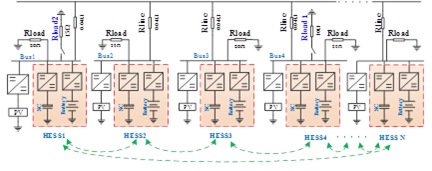
图1 含分布式复合储能的直流微电网
2)蓄电池控制器
图2为蓄电池的控制器结构,具有分层式控制结构,其中上层包含两个部分,一个是xi 一致性控制(xi consensus control),另一个是SC 端电压控制(SC terminal voltage control),下层控制是电流控制(Current control)反馈蓄电池的输出电流信号,跟踪上层控制给出的电流指令值。xi 是本文定义的与蓄电池SoC相关的状态变量,xi consensus control能够实现蓄电池的SoC 水平向一致的方向收敛,保证剩余容量多的储能多放电,少充电;剩余容量少的电池少放电,多充电,从而避免单个电池的过充过放。SC terminal voltage control能够使超级电容器在暂态过程后端电压恢复到额定值,为下次充放电过程做准备。
xi consensus control 中用到的一致性算法需要相邻蓄电池之间传输xi信号,其中xj表示与i相邻的j节点的xj信号。本文设计的复合储能控制策略,只需要相邻节点之间进行通讯,且每个复合储能单元的控制器均具有相同的分布式控制形式,不存在领导者(leader)节点获取指定的参考信号,因此避免了单个重要节点故障引起的全局控制器失效。
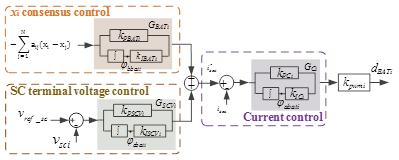
图2 蓄电池控制器结构
3)超级电容器控制
图3为超级电容器控制器结构,与蓄电池控制器具有类似的分层式控制结构,其上层控制包含超级电容器电压一致性控制(SC voltage consensus control)和母线电压控制(Bus voltage control)。SC voltage consensus control目的是实现各SC具有相同的端电压,即保证各SC存贮的电量相同。Bus voltage control 目的是控制系统各母线电压的平均值达到额定值。图中vavgi是由电压观测器(voltage observer)得到的母线电压平均值,任何系统不平衡功率引起的母线电压波动都最先反馈到超级电容器的Bus voltage control,超级电容器快速输出或吸收功率平抑母线电压波动, 由此造成的超级电容器端电压变化,由蓄电池的SC terminal voltage control 补偿,这种间接的响应方式,实现了超级电容器补偿高频不平衡功率,蓄电池补偿低频不平衡功率的控制目标。
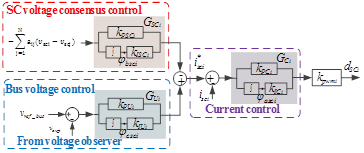
图3 超级电容器控制器结构
Conclusion
In this paper, a distributed cooperative control scheme is proposed for HESSs to compensate for the power imbalance and regulate the DC voltage in a microgrid. The advantages of this paper can be summarized as follows.
1. It can realize effective power splitting between batteries and SCs by setting the bandwidth of the outer-loop voltage controller. Thus, the batteries can respond to the low-frequency component of the unbalanced power and SCs to the high-frequency component.
2. The control of the average DC bus voltage, the SC terminal voltage, and the state variable associated with the battery SOC are all designed to reach consensus. Therefore, the control scheme can improve the performance of the voltage regulation and prevent the SOC from violation.
3. The leaderless consensus-based distributed control scheme is robust against single-point physical or communication failures.
作者简介:

Xia Chen (M’13-SM’18) received the B.S. degree in power system and its automaton from Wuhan University of Technology, China, in 2006, and the M.S. and Ph.D. degrees in electrical engineering from Huazhong University of Science and Technology (HUST), China, in 2008 and 2012, respectively. She was a Post-Doctoral Research Fellow with the University of Hong Kong, from 2012 to 2015. In 2015 she joined the HUST and now she is an associate professor with the School of Electrical and Electronic Engineering, HUST. Her research interests include distributed control technology in microgrid, renewable energy integration technologies, and new smart grid device.

Mengxuan Shi (S’17) received the B.S. degree in electrical engineering from Huazhong University of Science and Technology (HUST), Wuhan, China, in 2016. She is currently working toward her Ph.D. degree in electrical engineering at HUST, Wuhan, China. Her current research interests include dc microgrids, distributed generation, and energy storages technologies.
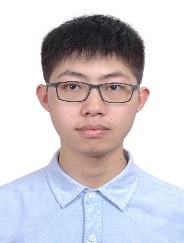
Jianyu Zhou received the B.S. degree in electrical engineering from Huazhong University of Science and Technology (HUST), Wuhan, China, in 2017. He is currently working toward his M.S. degree in electrical engineering at HUST, Wuhan, China. His research interests include dc microgrids, distributed control, hybrid energy storage.
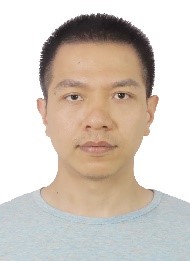
Yin Chen received the B.S. degree from electrical engineering from Huazhong University of Science and Technology (HUST), Wuhan, China, in 2009, and the M.S. degree in electrical engineering, Zhejiang University, Hangzhou, China, in 2014. He is currently working toward the Ph.D. degree with the Department of Electronic and Electrical Engineering, University of Strathclyde, Glasgow, U.K.. His current research interests include modeling and control of dc system.
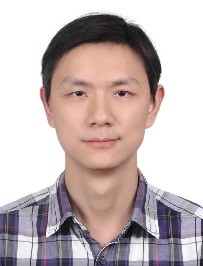
Wenping Zuo received the B.S. degree and Ph.D degree in electrical engineering from Huazhong University of Science and Technology (HUST), Wuhan, China, in 2009 and 2017, respectively. Currently he is a Post-Doctoral Research Fellow with HUST. His research interests include DC grid key equipment, energy storage, and renewable energy integration.
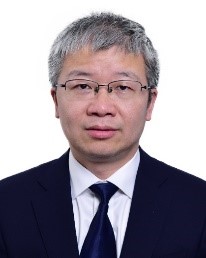 Jinyu Wen (M’10) received the B.Eng. and Ph.D. degrees all in electrical engineering from Huazhong University of Science and Technology (HUST), Wuhan, China, in 1992 and 1998, respectively. He was a visiting student from 1996 to 1997 and research fellow from 2002 to 2003 all at the University of Liverpool, UK, and a senior visiting researcher at the University of Texas at Arlington, USA in 2010. From 1998 to 2002 he was a director engineer in XJ Electric Co. Ltd. in China. In 2003 he joined the HUST and now is a professor at HUST. His current research interests include renewable energy integration, energy storage application, dc grid, and power system operation and control.
Jinyu Wen (M’10) received the B.Eng. and Ph.D. degrees all in electrical engineering from Huazhong University of Science and Technology (HUST), Wuhan, China, in 1992 and 1998, respectively. He was a visiting student from 1996 to 1997 and research fellow from 2002 to 2003 all at the University of Liverpool, UK, and a senior visiting researcher at the University of Texas at Arlington, USA in 2010. From 1998 to 2002 he was a director engineer in XJ Electric Co. Ltd. in China. In 2003 he joined the HUST and now is a professor at HUST. His current research interests include renewable energy integration, energy storage application, dc grid, and power system operation and control.
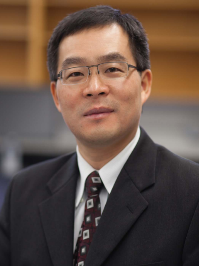
Haibo He (SM’11-F’18) received the B.S. and M.S. degrees in electrical engineering from Huazhong University of Science and Technology, Wuhan, China, in 1999 and 2002, respectively, and the Ph.D. degree in electrical engineering from Ohio University, Athens, OH, USA, in 2006. He is currently the Robert Haas Endowed Professor and the Department Chair in the Electrical Engineering Department at the University of Rhode Island, Kingstown, RI, USA.His current research interests include computational intelligence, smart grid, cyber security, and various applications such as smart grid, cognitive radio, sensor networks, and others. He has published 1 sole-author research book (Wiley), edited 1 book (Wiley–IEEE) and 6 conference proceedings (Springer), and authored and coauthored more than 280 peer-reviewed journal and conference papers.
Dr. He is currently the Editor-in-Chief for the IEEE Transactions on Neural Networks and Learning Systems. He received the IEEE International Conference on Communications Best Paper Award in 2014, the IEEE Computational Intelligence Society Outstanding Early Career Award in 2014, the National Science Foundation CAREER Award in 2011, and the Providence Business News “Rising Star Innovator of The Year” Award in 2011.
期刊简介:IEEE Transactions on Industrial Electronics为SCI 1区期刊,影响因子7.503,涵盖了电子,控制和通信,仪器仪表和计算智能的应用,以增强工业和制造系统及过程。